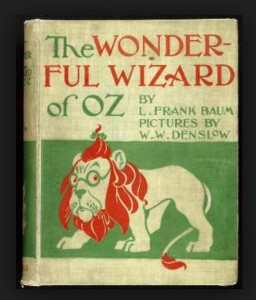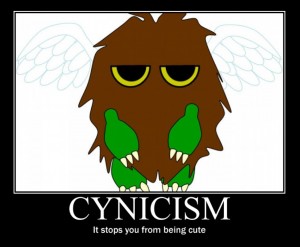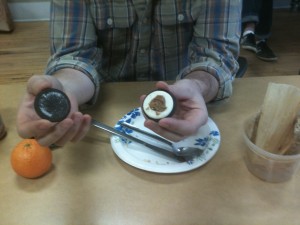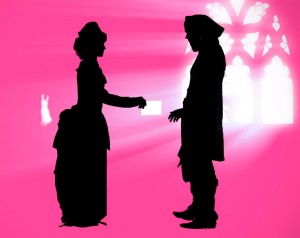Forever Off to See the Wizard
 I am an Oz geek. I am not ashamed to admit it. I quite literally grew up on the Oz books. I learned to read out of The Wizard of Oz. I had a babysitter, the teenage daughter of family friends, who had a bunch of the Baum sequels and whenever she came over to sit, or we went to their house to visit, those books were open. When she went away to college, she gave them to me, and I still have them. I’m now reading them to my son.
I am an Oz geek. I am not ashamed to admit it. I quite literally grew up on the Oz books. I learned to read out of The Wizard of Oz. I had a babysitter, the teenage daughter of family friends, who had a bunch of the Baum sequels and whenever she came over to sit, or we went to their house to visit, those books were open. When she went away to college, she gave them to me, and I still have them. I’m now reading them to my son.
And let me tell you, these are some truly weird books. You get past THE WIZARD OF OZ and you find out Piers Anthony’s Xanth has got nothing on Oz. There’s a magnificently strange scene in THE TINWOODMAN OF OZ where Nick Chopper, the Tin Woodsman, discovers his old head, in a cupboard, and has an argument with it. Or there’s the magician who makes a glass cat, but doesn’t want it to have the to repeat Tin Woodsman’s problem with not having a heart. So, he puts in a ruby heart. The problem is, because the heart is made of stone, the cat is hard-hearted.
But it’s the story in the first book that everybody knows. The tale of Dorothy and her three companions that we all love and that gets re-told and re-worked and is so firmly a part of the cultural landscape.
Why?
I’ve tried to work this out every so often, but I’ve got to say I’ve never quite managed it to my own satisfaction. I mean, I love the stories because I love them. Because they’re neat. Because they’re weird. Because Dorothy is unflappable without being cloying (all props to Judy Garland, but she didn’t get across the sheer nerve of the Dorothy in the books). But clearly I’m not the only one who remains captivated by the story.
I mean there’s the obvious reason that they’re out of copyright and so anybody can do anything with them, but that wasn’t true for the 20th century when most of the great adaptations were made. So it’s got to be more than just found material.
The movie’s got a lot to do with it, of course. Although, it didn’t at first. It never made back its $3 million budget and was considered a flop (!!) until it was rescued by TV (ain’t that just the tail wagging the dog?), and we all came to know it with Judy Garland’s breathless, dreamy Dorothy, Margaret Hamilton’s amazing Wicked Witch of the West, not to mention Burt Lahr’s Brooklyn-accented Cowardly Lion and those wonderful songs by E.Y. Harburg.
SIDE NOTE: I think it’s because of that movie that the sequels never seem to quite work. The road trip finished and the books shuffle the chacacters around, but no one has ever managed to approach the emotional connection the movie creates.
But it’s the story itself that does it. In a lot of ways, Oz is the first iteration of the road trip. Seriously. The Yellow Brick road is the most famous thoroughfare in American letters. And on it we have a group of buddies each of whom is searching for something (all together now: “A heart, a home, a brain, da noive!”) to make them complete. They are not princes and princesses, they are working folk who have all had hard luck somehow; a poor farm girl, an unsuccessful scarecrow, a cursed lumberjack (if you’ve read the book you know he’s made of tin because the Wicked Witch of the East put a spell on his axe and he cut himself to pieces), and a cowardly lion. They are all looking to a Wonderful Wizard to save them from their troubles, but in the end, they all save themselves.
Which is what is really remarkable about the story, because it is reconstructing and deconstructing the traditional fairy tale at the same time. The tales the Brothers Grimm collected there are endless variations on the clever peasant boy or girl heading out to find something they need (you can actually measure the age of a fair tale this way. In the oldest stories, they get food, in the newest they get royalty), and finding help on the way. But in the traditional stories, what is needed is genuine, as is the king or wizard who can ultimately bestow it. In Oz, the characters have what they need inside them, and the wizard is a con man. In fact, in the book anyway, the Emerald City itself is a fake. All the people have to wear green glasses, supposedly so they’re not blinded by the brilliance of it, but actually so that it will look green.
It’s a story of independence as well as friendship, personal triumph as well as a successful quest.
There’s also the fact that what they’re after is not riches, or royalty or even a decent lunch. One wants to be smarter than he is, one wants to be able to love, one wants to be brave and one just wants to go home. Except for Dorothy, the quests are internal. The three companions all want to be better people, but not like Pinnochio who had to change his whole nature and then get a fairy to decide to make him real. Lion, Scarecrow and Tinman are happy enough in their own skins. None of them considers himself unreal in any way. They just have parts of themselves they wish were better. The belief in the possibility of self-improvement and getting along on the your own strengths is what makes this story uniquely American. There’s no miricle of birth, no fairy godmother, no divine intervention. It’s just people doing their best.
What’s amazing about Oz is that it really is an incredibly gentle work, and Baum did that deliberately. He was reacting to the horrible Victorian-era moral fables like Shock-Headed Peter (in which boys who suck their thumbs have them cut off) and The New Mother (in which disobedient girls are abandoned by their mother to the care of a monster), but it is notably lacking in moralizing or attempts to be Improving or punishments for evil. Even the death of the witches is accomplished pretty quickly. Nobody is rolled downhill in a barrel stuck full of nails (as in the Brother’s Grimm), nobody dies and goes to Heaven to get their happy ending (as in Hans Christian Anderson). That whole speech Dorothy gives at the end of the movie about how she’s learned to never look for paradise beyond her own back yard? That’s Hollywood adding an air of hard-nosed Protestanism that never shows up in the book. Baum just has Dorothy hold out bravely until the end, when she really makes it home from the real journey she has been on. Oh, she’s a good kid, but no one lectures, no one moralizes, and God does not enter into the question at all. The story was written for fun to entertain children and as such it holds up beautifully.
And that’s the other reason it’s lasted. Because Baum declined to give it a specific moral, it can be read and re-read by each generation with fresh eyes. Like Shakespere (yes, I said like Shakespere and I meant it), the story is simple enough that everyone can see a new way to tell it, a new setting to place in it. Oz is a big country and leaves plenty of room for the imagnination.
 Writers are famous for complaining about their jobs.
Writers are famous for complaining about their jobs.






 I’ve been reading for research lately. This has led me into the realm of the Published Rant. Which has in turn, led to the following:
I’ve been reading for research lately. This has led me into the realm of the Published Rant. Which has in turn, led to the following: I don’t have pictures of this.
I don’t have pictures of this.
 Teenreads.com and the Children’s Book Council are accepting nominations for the Teen Choice Book of the Year award. Thanks to all my great readers and bloggers,
Teenreads.com and the Children’s Book Council are accepting nominations for the Teen Choice Book of the Year award. Thanks to all my great readers and bloggers,